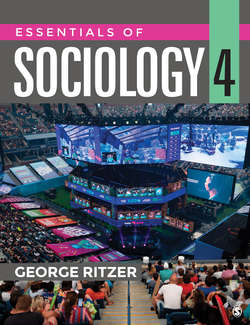Читать книгу Essentials of Sociology - George Ritzer - Страница 71
На сайте Литреса книга снята с продажи.
Participant and Nonparticipant Observation
ОглавлениеIn participant observation the researcher actually plays a role, even a minor one, in the group or setting being observed. A participant observer might become a hostess or bartender to study the sex industry in Ho Chi Minh City, Vietnam (Hoang 2015), sell books on the sidewalk to watch what happens on a busy city street (Duneier 1999), or live in a trailer park to witness how individuals cope with poverty (Desmond 2016; see the Trending box in Chapter 7, page 192). Aasha Abdill (2018) spent four years studying black fathers in a low-income area of Brooklyn, discovering that they are present in their children’s daily lives despite high rates of unemployment and incarceration. CNN’s Somebody’s Gotta Do It is essentially an informal exercise in the participant observation of work. The host, Mike Rowe, is not a trained sociologist and he is not trying, at least consciously, to uncover the sociological aspects of the jobs he studies, but he is a participant observer. In each episode, he actually does the job being examined—he is a participant—and he observes the workers as well as their dirty jobs. Among the jobs Rowe has performed and observed on the show are “turd burner,” owl vomit collector, baby chicken sexer, sheep castrator, rat exterminator, maggot farmer, diaper cleaner, and high-rise building window washer.
Ask Yourself
Do you think participant observers risk losing their objectivity when they grow too close to the subjects under study? Why or why not? What about nonparticipant observers? How can sociologists conducting observational research avoid becoming too involved with subjects?
In nonparticipant observation the sociologist plays little or no role in what is being observed. Gary Fine has done nonparticipant observation research on Little League baseball (Fine 1987), restaurant kitchens (Fine 2008), meteorologists (Fine 2010), and chess players involved in a chess tournament (Fine 2015).
There are no firm dividing lines between participant and nonparticipant observation, and at times the two blend imperceptibly into one another. The participant often becomes simply an observer. An example is the sociologist who begins with participant observation of a gang, hanging out with members in casual settings, but becomes a nonparticipant when illegal activities such as drug deals take place. And the nonparticipant observer sometimes becomes a participant. An example is the sociologist who is unable to avoid being asked to take sides or share opinions in squabbles among members of a Little League team or, more likely, among their parents.
